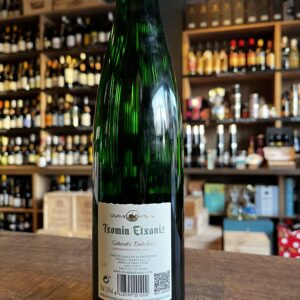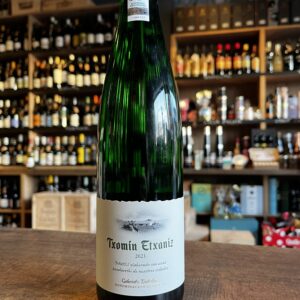-
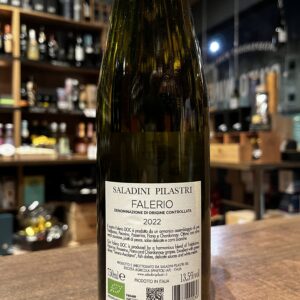
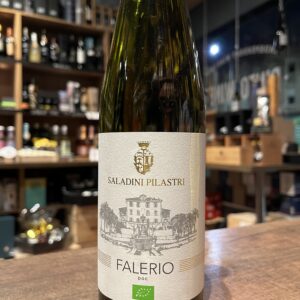 Saladini Pilastri is located in Spinetoli, in the Marche region of Italy . The history of the Counts Saladini Pilastri, a noble family from Ascoli Piceno, dates back to the early 1000s, but it is only for around 300 years that the family has been dedicated to wine production. Its 320 hectare wine estate is located in the heart of the Rosso Piceno production area. From the 1970s, new vines were planted; The current winery was built next to the splendid 15th century country house “Vigna Palazzi”, which originally served as a production site, so that all production could be kept in one place. The vineyard has been certified in organic farming since 1994. The climate here is Mediterranean, with hot, dry summers tempered by the maritime influence of the Adriatic Sea only 8km away from the vineyards. All the farming is organic and the winery is equipped with all the latest wine-making mod cons, helping speeding up the complex time of production and maintain quality. In true Italian style-Great wine with great food it helps that at the heart of the estate is a plush mansion house with a sweet swimming pool!. True quality of life. If I wasn't Portuguese, Italy would be where I would retire. Food-friendly as they come, its easy-going qualities match well with antipasti or even creamy pasta dishes but especially fish orientated dishes. Goditi il Vino!
Saladini Pilastri is located in Spinetoli, in the Marche region of Italy . The history of the Counts Saladini Pilastri, a noble family from Ascoli Piceno, dates back to the early 1000s, but it is only for around 300 years that the family has been dedicated to wine production. Its 320 hectare wine estate is located in the heart of the Rosso Piceno production area. From the 1970s, new vines were planted; The current winery was built next to the splendid 15th century country house “Vigna Palazzi”, which originally served as a production site, so that all production could be kept in one place. The vineyard has been certified in organic farming since 1994. The climate here is Mediterranean, with hot, dry summers tempered by the maritime influence of the Adriatic Sea only 8km away from the vineyards. All the farming is organic and the winery is equipped with all the latest wine-making mod cons, helping speeding up the complex time of production and maintain quality. In true Italian style-Great wine with great food it helps that at the heart of the estate is a plush mansion house with a sweet swimming pool!. True quality of life. If I wasn't Portuguese, Italy would be where I would retire. Food-friendly as they come, its easy-going qualities match well with antipasti or even creamy pasta dishes but especially fish orientated dishes. Goditi il Vino! -
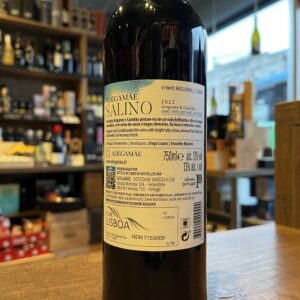
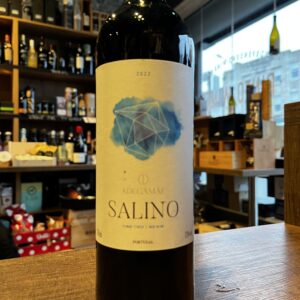 Salino is from north from Lisbon (Torres Vedras) and just a step away from the ocean, AdegaMãe brings out the best of a terroir strongly influenced by the prevailing sea breezes, standing out for its Atlantic-inspired wines, brimming with character, freshness and minerality. The winery was built by the Alves family, founder of Riberalves Group, AdegaMãe is born as a tribute from the men to the family’s matriarch, Manuela Alves. On this particular project, 2 star winemakers were asked to do an everydays wine that brings quality and immediate expression to the palate. Pair it with Charcuterie of all sorts, red meats and stews
Salino is from north from Lisbon (Torres Vedras) and just a step away from the ocean, AdegaMãe brings out the best of a terroir strongly influenced by the prevailing sea breezes, standing out for its Atlantic-inspired wines, brimming with character, freshness and minerality. The winery was built by the Alves family, founder of Riberalves Group, AdegaMãe is born as a tribute from the men to the family’s matriarch, Manuela Alves. On this particular project, 2 star winemakers were asked to do an everydays wine that brings quality and immediate expression to the palate. Pair it with Charcuterie of all sorts, red meats and stews -
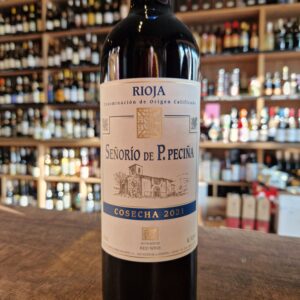 Bodegas Hermanos de Peciña is firmly planted in the old school camp. Although the estate was started only in 1992, its founder, Pedro Peciña had worked for over 20 years prior to that as the head agronomist for La Rioja Alta, learning all facets of production and especially the planting and managing of all the estate’s vineyards. The Peciña winery and vineyards are located in San Vicente, which while technically in the Rioja Alta sub-zone, is not in the vicinity of Haro where most of the other traditional Rioja houses have their cellars. Rather it is located on the northeast side of the Ebro river near the border of the Basque Alavesa zone. These vineyards - many 40 to 60 years old - are actually some of the finest in the appellation as they fall at the foothills of the Sierra Cantabria Mountains at an average of 500 meters, and offer hillside expositions as well as complex and diverse soils. Many of Peciña’s most prized vineyards are actually on north facing slopes which Pedro feels helps give the wines good freshness and delineation. Serve with aperitif, Charcuterie, Cured cheeses, Smoked foods
Bodegas Hermanos de Peciña is firmly planted in the old school camp. Although the estate was started only in 1992, its founder, Pedro Peciña had worked for over 20 years prior to that as the head agronomist for La Rioja Alta, learning all facets of production and especially the planting and managing of all the estate’s vineyards. The Peciña winery and vineyards are located in San Vicente, which while technically in the Rioja Alta sub-zone, is not in the vicinity of Haro where most of the other traditional Rioja houses have their cellars. Rather it is located on the northeast side of the Ebro river near the border of the Basque Alavesa zone. These vineyards - many 40 to 60 years old - are actually some of the finest in the appellation as they fall at the foothills of the Sierra Cantabria Mountains at an average of 500 meters, and offer hillside expositions as well as complex and diverse soils. Many of Peciña’s most prized vineyards are actually on north facing slopes which Pedro feels helps give the wines good freshness and delineation. Serve with aperitif, Charcuterie, Cured cheeses, Smoked foods -
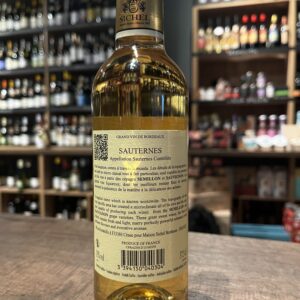
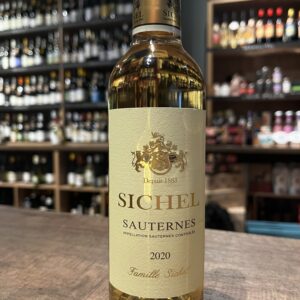 This is a declassified wine from a top Chateau in Sauternes...shhh, they dont want you to know their name! or...just keep reading Maison Sichel is a Bordeaux based, family owned and run negociant of six generations. The Sichel family have been a sugnificant prescence in Bordeaux since 1883 and have continued to expand operations by purchasing several properties in Bordeaux including Chateau Angludet and Chateau Argaden. The Sichel family also joined with three other family in 1938 to purchase the now legendary Chateau Palmer. Maison Sichel continued to expand their operations outside of Bordeaux with Chateau Trillol in Corbieres and have several high quality own label wines such as the Sichel Sauternes and the Sichel Margaux. The Sichekl Vineyards are situated some 40 kilometers south east of Bordeaux, between the Garonne river and the Landes forest to the south. A blend of 80% Semillon, 15% Sauvignon Blanc and 5% Muscadelle from 50 year old vines where Botrytis is encouraged to dehydrate the grapes. This Sauterne has been aged for 10 to 12 months.
This is a declassified wine from a top Chateau in Sauternes...shhh, they dont want you to know their name! or...just keep reading Maison Sichel is a Bordeaux based, family owned and run negociant of six generations. The Sichel family have been a sugnificant prescence in Bordeaux since 1883 and have continued to expand operations by purchasing several properties in Bordeaux including Chateau Angludet and Chateau Argaden. The Sichel family also joined with three other family in 1938 to purchase the now legendary Chateau Palmer. Maison Sichel continued to expand their operations outside of Bordeaux with Chateau Trillol in Corbieres and have several high quality own label wines such as the Sichel Sauternes and the Sichel Margaux. The Sichekl Vineyards are situated some 40 kilometers south east of Bordeaux, between the Garonne river and the Landes forest to the south. A blend of 80% Semillon, 15% Sauvignon Blanc and 5% Muscadelle from 50 year old vines where Botrytis is encouraged to dehydrate the grapes. This Sauterne has been aged for 10 to 12 months. -
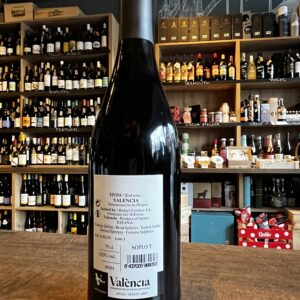
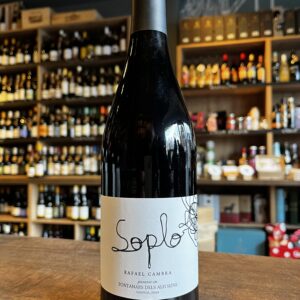 Rafael Cambra has spent most of his life in a vineyard. His family own one of the most prestigious nurseries in Spain, with clients like Vega Sicilia, Alvaro Palacios and many more. He established his own cellar in 2001 after finding a vineyard with 50-year-old Monastrell vines. He also planted some Cabernet Sauvignon and Cabernet Franc. The vineyards lie in the lowest part of the Sierra, inland from Valencia, with olive and almond trees surrounding them. Rafael believes in minimal intervention when it comes to wine-making, creating elegant yet restrained wines. He is an innovative wine-maker, constantly experimenting with different grapes and blends until completely satisfied with the result. Charcuterie, Red meat, White meat, Poultry, Mushroom, Barbecue, Exotic cuisine, Cheese.
Rafael Cambra has spent most of his life in a vineyard. His family own one of the most prestigious nurseries in Spain, with clients like Vega Sicilia, Alvaro Palacios and many more. He established his own cellar in 2001 after finding a vineyard with 50-year-old Monastrell vines. He also planted some Cabernet Sauvignon and Cabernet Franc. The vineyards lie in the lowest part of the Sierra, inland from Valencia, with olive and almond trees surrounding them. Rafael believes in minimal intervention when it comes to wine-making, creating elegant yet restrained wines. He is an innovative wine-maker, constantly experimenting with different grapes and blends until completely satisfied with the result. Charcuterie, Red meat, White meat, Poultry, Mushroom, Barbecue, Exotic cuisine, Cheese. -
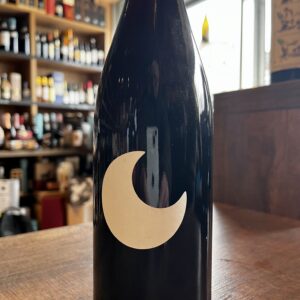
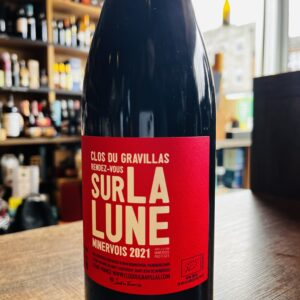 This Sur La Lune from Le Clos du Gravillas is a dazzling expanse of white limestone pebbles on a plateau at an altitude of 300 meters in the Haut Languedoc Natural Park. Between the gorges of St Chinian and Minerve, surrounded by scrubland and holm oaks, the 8.30 hectare estate is managed with respect for the terroir, in organic farming with concern for the preservation of the biodiversity of fauna and the surrounding flora. This wine comes from 3 plots on the Cazelles plateau: Syrah from a place called “Esperandieu”, a very pretty place surrounded by hills covered with scrubland, almond trees, broom and oaks where they also planted 48 pomegranate trees, 25 fig trees as well as cherry and apricot trees. The 80 year old vine of Carignan planted with Grenache from the place called Carretals and the 40-year-old Carignan vine from the place called Roque de Beau. Serve rather chilled but not too cold, ensuring that the wine does not heat up excessively in the bottle or in the glasses. A slight opening time prior to service may be beneficial.vThis wine beyond all the technicallities and sense of place it is a straight wine without organoleptic deviation, without volatile phenols, pure, with perfect control and ultimately delicious. Slainte!
This Sur La Lune from Le Clos du Gravillas is a dazzling expanse of white limestone pebbles on a plateau at an altitude of 300 meters in the Haut Languedoc Natural Park. Between the gorges of St Chinian and Minerve, surrounded by scrubland and holm oaks, the 8.30 hectare estate is managed with respect for the terroir, in organic farming with concern for the preservation of the biodiversity of fauna and the surrounding flora. This wine comes from 3 plots on the Cazelles plateau: Syrah from a place called “Esperandieu”, a very pretty place surrounded by hills covered with scrubland, almond trees, broom and oaks where they also planted 48 pomegranate trees, 25 fig trees as well as cherry and apricot trees. The 80 year old vine of Carignan planted with Grenache from the place called Carretals and the 40-year-old Carignan vine from the place called Roque de Beau. Serve rather chilled but not too cold, ensuring that the wine does not heat up excessively in the bottle or in the glasses. A slight opening time prior to service may be beneficial.vThis wine beyond all the technicallities and sense of place it is a straight wine without organoleptic deviation, without volatile phenols, pure, with perfect control and ultimately delicious. Slainte! -
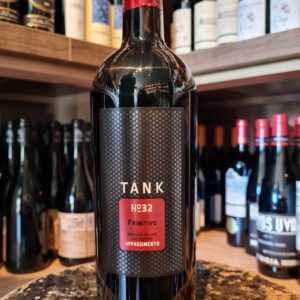 The TANK No 32 Primitivo Appassimento from Cantine Minini sparkles a wonderful dark red wine. This Italian red inspires with its perfect combination of elegance and power. The bouquet reveals aromas of ripe cherries, juicy plums and dried fruit, especially figs, dates and raisins come to mind. The palate of TANK 32 impresses with its dense and concentrated character. The pleasant and equally discreet residual sweetness gives this red wine a wonderful velvety texture. The long finish of Tank No 32 is carried by delicate notes of nougat and dark chocolate. The Tank No 32 Apassimento is a great accompaniment to strong game dishes with fresh mushrooms and well matured cheeses.
The TANK No 32 Primitivo Appassimento from Cantine Minini sparkles a wonderful dark red wine. This Italian red inspires with its perfect combination of elegance and power. The bouquet reveals aromas of ripe cherries, juicy plums and dried fruit, especially figs, dates and raisins come to mind. The palate of TANK 32 impresses with its dense and concentrated character. The pleasant and equally discreet residual sweetness gives this red wine a wonderful velvety texture. The long finish of Tank No 32 is carried by delicate notes of nougat and dark chocolate. The Tank No 32 Apassimento is a great accompaniment to strong game dishes with fresh mushrooms and well matured cheeses. -
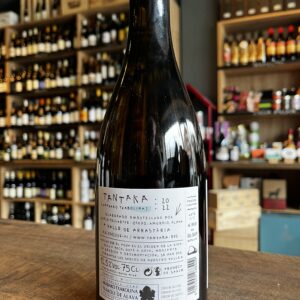
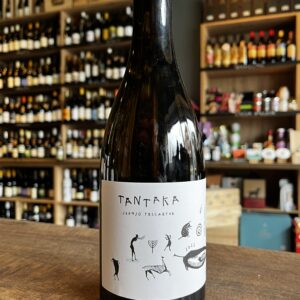 Tantaka is a white wine aged on lees made with the Hondarribi Zuri variety in the D.O. Arabako-txakolina (Basque Country) by Juanjo Tellaetxe. Juanjo Tellaetxe which happens to be a priest and a shepherd made his dream a reality when he implemented his work philosophy in the Arrastaria Valley vineyards (Álava) to make honest wines with a strong local character. To do that, the Tantaka winery is committed to using native varieties, cultivated in an environmentally-respectful way and with minimum intervention in the winery. The soils are characterised by their alluvial and semi-deep character, with a climate that ranges from Atlantic to continental, depending on the vintage Pair it with seafood, baked fish, vegetables and pork.
Tantaka is a white wine aged on lees made with the Hondarribi Zuri variety in the D.O. Arabako-txakolina (Basque Country) by Juanjo Tellaetxe. Juanjo Tellaetxe which happens to be a priest and a shepherd made his dream a reality when he implemented his work philosophy in the Arrastaria Valley vineyards (Álava) to make honest wines with a strong local character. To do that, the Tantaka winery is committed to using native varieties, cultivated in an environmentally-respectful way and with minimum intervention in the winery. The soils are characterised by their alluvial and semi-deep character, with a climate that ranges from Atlantic to continental, depending on the vintage Pair it with seafood, baked fish, vegetables and pork. -
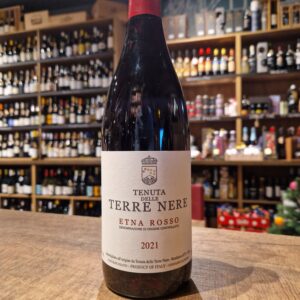
On the island of Sicily, at the foot of Mount Etna, brothers Marco and Sebastian De Grazia have been running their winemaking project for more than 30 years. At Tenuta Delle Terre Nere they make refined and pure wines that express the extraordinary location they call home. Starting with excellent raw materials and winemaking with very little intervention, the De Grazia brothers’ work has helped put Etna at the top of the world wine map.
Tenuta Delle Terre Nere Etna Rosso comes from both young and old vines that grow on the north slope of Mount Etna. These vines are planted in volcanic soil at an altitude ranging from 600 to 900 metres above sea level. Organic farming is practiced and the yield is limited to 35 hl. per hectare. The harvest is carried out manually at the optimum point of ripeness.
Pure and elegant, Tenuta Delle Terre Nere Etna Rosso is a red wine with the delicacy of a Burgundy and the length of a Pinot Noir. A true representative of a promising wine region.
Pair it with white meats, Pasta, Red meat, Rice dishes
-
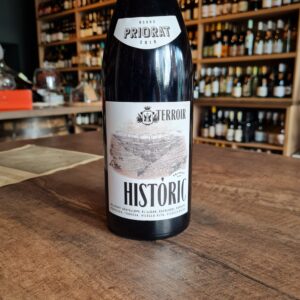 Històric Negre is a red wine from the D.O. Priorat, produced by the Terroir al Límit winery.
Històric Negre is a red wine from the D.O. Priorat, produced by the Terroir al Límit winery.All the wines at Terroir Al Límit are elaborated practicing sustainable viticulture, with a great respect for the nature and its surroundings. The wines are organically farmed following ecological principles. Respect of the environment makes itself throughout the winemaking process, from the grape harvest down to the bottling. The grapes are hand harvested and hand sorted both in the vineyards an the Cellar. Since its beginning in 2004, Terroir Al Limit has reached a highly respected status not only in the region but also worldwide, producing wines of highest purity and maximum expression of terroir.
Made from mostly Garnacha with the remaining quarter being Cariñena the fruit is sourced from vineyards in nine of the historic Priorat villages. The fruit is put in cement tanks, gently crushed and then essentially left to ferment with as little interference as possible. Super elegant wine, with a lot of character and honest expression of the one most iconic regions in Spain.
Decant it for 2 hours, enjoy it with great food or on its own -
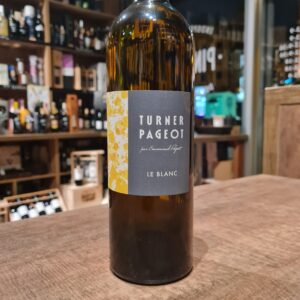 Australian scientist Karen Turner and her husband Emmanuel farm 10 hectares in the Languedoc bring you this incredible intro to orange wine! The 3 grapes here are fermented like a red wine, skins, stalks, and all-- making for white with the tannins and structure of a red. Karen’s says her goal with ‘Le Blanc’ is to bring body and freshness to the wine. The north-facing slopes where their vineyards grow on help to ensure a long and even maturation for the grapes. While Marsanne is not usually an aromatic varietal, Karen’s use of open vats brings out the heady aromas of tangerine and mango. Full-bodied and approachable, it smells like orange rinds and white flowers wilting in the sun, and tastes like yellow peaches, those tangerines and dry, dusty earth, but never loses its identity as a white wine. LADY IN CHARGE: While husband Emmanuel manages the vineyards, the real star is his wife Karen, who makes the wine and also works as the head winemaker and manager of another (very famous) Languedoc winery, Prieuré de Saint Jean de Bébian. Serious girl boss! Decant for 20 minutes before enjoying. It’ll open up and reveal its prettiness with air. Perfect for poultry, fish, cheese and early dishes. Also wonderful in itself.
Australian scientist Karen Turner and her husband Emmanuel farm 10 hectares in the Languedoc bring you this incredible intro to orange wine! The 3 grapes here are fermented like a red wine, skins, stalks, and all-- making for white with the tannins and structure of a red. Karen’s says her goal with ‘Le Blanc’ is to bring body and freshness to the wine. The north-facing slopes where their vineyards grow on help to ensure a long and even maturation for the grapes. While Marsanne is not usually an aromatic varietal, Karen’s use of open vats brings out the heady aromas of tangerine and mango. Full-bodied and approachable, it smells like orange rinds and white flowers wilting in the sun, and tastes like yellow peaches, those tangerines and dry, dusty earth, but never loses its identity as a white wine. LADY IN CHARGE: While husband Emmanuel manages the vineyards, the real star is his wife Karen, who makes the wine and also works as the head winemaker and manager of another (very famous) Languedoc winery, Prieuré de Saint Jean de Bébian. Serious girl boss! Decant for 20 minutes before enjoying. It’ll open up and reveal its prettiness with air. Perfect for poultry, fish, cheese and early dishes. Also wonderful in itself. -
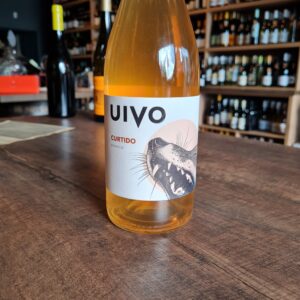 Uivo, a howl back to Nature! Naturally farmed Moscatel Galego, Branco Wine grapes with minimal intervention in the cellar, 4 months of skin contact in cement tanks. Folias de Baco was started in 2007 by young, innovative winemaker, Tiago Sampaio, who was inspired by his grandfather’s vineyard work. He has a vivacious curiosity and loves to experiment at every step of the winemaking/growing processes. He has studied agricultural engineering and has a PhD in Viticulture and Enology from Oregon State University, where he picked up on modern philosophies and aesthetics of winemaking, never forgetting his Douro roots. Folias de Baco is in the Alto Douro, in the sub-region of Cima-Corgo where the land is very tough and challenging at a higher altitude, but it is an expression of traditional melding with modern techniques. The ‘Uivo Curtido’ is comprised of 100% moscatel galego from 35+ year old vines in soils spattered with schist and granite. It is unfined and unfiltered. As tasty as it looks. Organically grown, low-intervention/natural wine, vegan. Have fun with it
Uivo, a howl back to Nature! Naturally farmed Moscatel Galego, Branco Wine grapes with minimal intervention in the cellar, 4 months of skin contact in cement tanks. Folias de Baco was started in 2007 by young, innovative winemaker, Tiago Sampaio, who was inspired by his grandfather’s vineyard work. He has a vivacious curiosity and loves to experiment at every step of the winemaking/growing processes. He has studied agricultural engineering and has a PhD in Viticulture and Enology from Oregon State University, where he picked up on modern philosophies and aesthetics of winemaking, never forgetting his Douro roots. Folias de Baco is in the Alto Douro, in the sub-region of Cima-Corgo where the land is very tough and challenging at a higher altitude, but it is an expression of traditional melding with modern techniques. The ‘Uivo Curtido’ is comprised of 100% moscatel galego from 35+ year old vines in soils spattered with schist and granite. It is unfined and unfiltered. As tasty as it looks. Organically grown, low-intervention/natural wine, vegan. Have fun with it -
Out of stock
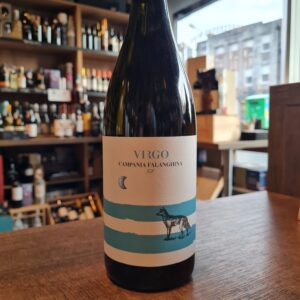 Villa Raiano was founded in 1996 in the old factories of the Basso family's oil mill, owner of the company in the Raiano hamlet of the municipality of Serino (AV). Built in 2009, the is structure perfectly integrated into the surrounding environment, surrounded by vineyards and woods. On top of it a panoramic terrace overlooking a wonderful valley carved by the river Sabato which descends proudly from Monte Terminio. This delicious summer wine from the extreme south of Italy makes you long for Italy. A delicious, light-footed summer wine with a sultry taste of honey, flowers and fresh notes of citrus fruits. The Falanghina grape is still relatively unknown in the Ireland, but in Italy a guarantee for a smooth summer wine that can be drunk on it's own or over lunch.The artisan winemakers of Villa Raiano are behind this fantastic Virgo Falanghina, you can expect high quality. In addition, all grapes are picked by hand by Gabrizia and her brothers. And you can taste it! A delicious traditional wine that is made with the utmost care in a sustainable way.
Villa Raiano was founded in 1996 in the old factories of the Basso family's oil mill, owner of the company in the Raiano hamlet of the municipality of Serino (AV). Built in 2009, the is structure perfectly integrated into the surrounding environment, surrounded by vineyards and woods. On top of it a panoramic terrace overlooking a wonderful valley carved by the river Sabato which descends proudly from Monte Terminio. This delicious summer wine from the extreme south of Italy makes you long for Italy. A delicious, light-footed summer wine with a sultry taste of honey, flowers and fresh notes of citrus fruits. The Falanghina grape is still relatively unknown in the Ireland, but in Italy a guarantee for a smooth summer wine that can be drunk on it's own or over lunch.The artisan winemakers of Villa Raiano are behind this fantastic Virgo Falanghina, you can expect high quality. In addition, all grapes are picked by hand by Gabrizia and her brothers. And you can taste it! A delicious traditional wine that is made with the utmost care in a sustainable way. -
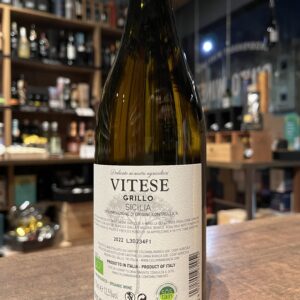
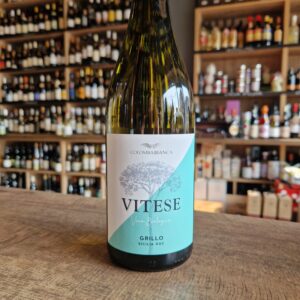 The Colomba Bianca winery was founded in 1970. During the last 10 years, under the guidance of our Chairman Leonardo Taschetta, it has become the biggest wine growing co-operative in Sicily. The company today, can, in fact, count on circa 2480 partners and extends along 7500 hectars of vineyards between the provinces of Trapani, Palermo, Agrigento, Caltanissetta e Ragusa, with 5 wineries distributed in the whole territory. The vineyards can be found in areas which benefit of a vast pedoclimatic diversity, from the low coastal areas up to an altitude of 600 metres above sea level. "We work with the aim that our farmers receive the right compensation for their work. This adds dignity to Sicilian agriculture and to the wines which express at best our territory. It is for this reason that each one of our wines is dedicated to our farmers." - Colomba Bianco Grillo is the flagship of Sicily's indigenous white varieties. Famous for its role in the production of Marsala wines, but has recently come into its own as a varietal making light, fresh and citrussy wines. Ideal with fish first courses, delicate risottos and white meat dishes.
The Colomba Bianca winery was founded in 1970. During the last 10 years, under the guidance of our Chairman Leonardo Taschetta, it has become the biggest wine growing co-operative in Sicily. The company today, can, in fact, count on circa 2480 partners and extends along 7500 hectars of vineyards between the provinces of Trapani, Palermo, Agrigento, Caltanissetta e Ragusa, with 5 wineries distributed in the whole territory. The vineyards can be found in areas which benefit of a vast pedoclimatic diversity, from the low coastal areas up to an altitude of 600 metres above sea level. "We work with the aim that our farmers receive the right compensation for their work. This adds dignity to Sicilian agriculture and to the wines which express at best our territory. It is for this reason that each one of our wines is dedicated to our farmers." - Colomba Bianco Grillo is the flagship of Sicily's indigenous white varieties. Famous for its role in the production of Marsala wines, but has recently come into its own as a varietal making light, fresh and citrussy wines. Ideal with fish first courses, delicate risottos and white meat dishes. -
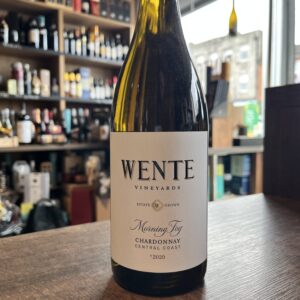 Estate Grown Morning Fog Chardonnay is named for the morning coastal fog pushed by Pacific wind streams into the bowl of the San Francisco Bay. This daily phenomenon moderates the climate to produce excellent, beautifully balanced Chardonnay.Wente Vineyards is one of the oldest, family run wineries, in America having been established in 1883. The Estate extends to some 3000 acres, 2000 in the San Francisco Bay appellation and 1000 acres in Arroyo Seco, Monterey to the south.Pioneers of the Californian Chardonnay clone Wente claim 80% of all Californian Chardonnay is from the Wente original clone. The family, German in origin, has long been innovators introducing stainless steel fermentation tanks in the 60’s and introducing varietal labelled wines as long ago as the 1930’s. Today, fifth generation winemaker Karl D. Wente carries on the family winemaking tradition. Such a smooth wine is delicious to enjoy alone at any time, but if you prefer to pair it, go for light flavoured meals like white meats, pastas, risottos with no added spice.
Estate Grown Morning Fog Chardonnay is named for the morning coastal fog pushed by Pacific wind streams into the bowl of the San Francisco Bay. This daily phenomenon moderates the climate to produce excellent, beautifully balanced Chardonnay.Wente Vineyards is one of the oldest, family run wineries, in America having been established in 1883. The Estate extends to some 3000 acres, 2000 in the San Francisco Bay appellation and 1000 acres in Arroyo Seco, Monterey to the south.Pioneers of the Californian Chardonnay clone Wente claim 80% of all Californian Chardonnay is from the Wente original clone. The family, German in origin, has long been innovators introducing stainless steel fermentation tanks in the 60’s and introducing varietal labelled wines as long ago as the 1930’s. Today, fifth generation winemaker Karl D. Wente carries on the family winemaking tradition. Such a smooth wine is delicious to enjoy alone at any time, but if you prefer to pair it, go for light flavoured meals like white meats, pastas, risottos with no added spice. -
 Wine is cheaper than Therapy! We put together these great wines, 3 whites and 3 reds that would put a smile on anyone's face, any day of the week. These wines can be enjoyed with or without food, but we always recommend a nibble. On the whites: Muralhas Vinho Verde - Monção e Melgaço has been producing wines and recognized for it since Roman occupation times, but was with Afonso III, 5th King of Portugal(1210-1279) that signed a ”Foral” that conceded Monção e Melgaço habitants the owners of the local wine and therefore they produced it with pride as they do today. The wine is made from the Alvarinho (predominant) and Trajadura varieties, indigenous to Portugal and the region, more specifically. The dry Muralhas de Moncao Vinho Verde never seems intrusive, but is soft, elegant and harmonious with no wood whatsoever. The wine goes well not only as an aperitif, but also with salads, seafood, fish dishes and white meat. Vitese Colomba Bianca Grillo Biologico- Grillo is the flagship of Sicily's indigenous white varieties, with its aromatic and floral nose. Fresh and harmonious on the well-structured palate, the Vitese Grillo has a long and elegant finish. Lovingly white, Lovingly good !! Bardos Rueda Verdejo- This artisan verdejo is part of the reason the Spanish Rueda region has become quite popular. Made unapologetically, you will find yourself like a true "Bard" drinking this wine. Delicious! On The Reds El Castro de Valtuille Joven - Made by the great Raul Perez. Fresh, mineral-tinged redcurrant and cherry scents that show very good clarity. Tangy, focused and pure on the palate, offering intense flavors of bitter cherry and red berry preserves. Shows a light touch that's quite pinot-like, along with a touch of smokiness that carries through a long, mineral-driven finish. If you want to show somebody what the Spanish region of Mencia smells, feels and tastes like, serve this one. Adega de Penalva Dão 'Indigena' Tinto -Adega de Penalva wines are delicious everyday examples of one of Portugal’s most intriguing appellations — the Dão. Perched above the Dão river itself as it snakes through its granite valleys, the Adega de Penalva is one of the leading cooperatives in the area, boasting around a thousand member growers. It’s important to note, though, that the average holding per member amounts to barely over a hectare—a figure that reminds us how tenaciously much of rural Portugal clings to its old ways. (On that note, all fruit destined for the ‘Indigena’ bottlings is hand-harvested.) Since its founding in the 1960s, the Adega has been collecting its members’ grapes and producing clean, characterful wines with a minimum of fuss. Aromas of leather and blueberries and notes of dark fruits with cherry and raspberry. Tank N32 Primitivo Appassimento IGT - Couldn't finish this wine case without bringing out the guns. This passionate and very well intended Italian red impresses with its perfect combination of elegance and strength. The bouquet reveals aromas of ripe cherries, juicy plums and dried fruit. In particular figs, dates and raisins come to mind. Has a dense and concentrated character. The pleasant and equally subtle residual sweetness gives this red wine a wonderful velvetiness. The long finish of Tank No 32 is carried by delicate notes of nougat and dark chocolate.
Wine is cheaper than Therapy! We put together these great wines, 3 whites and 3 reds that would put a smile on anyone's face, any day of the week. These wines can be enjoyed with or without food, but we always recommend a nibble. On the whites: Muralhas Vinho Verde - Monção e Melgaço has been producing wines and recognized for it since Roman occupation times, but was with Afonso III, 5th King of Portugal(1210-1279) that signed a ”Foral” that conceded Monção e Melgaço habitants the owners of the local wine and therefore they produced it with pride as they do today. The wine is made from the Alvarinho (predominant) and Trajadura varieties, indigenous to Portugal and the region, more specifically. The dry Muralhas de Moncao Vinho Verde never seems intrusive, but is soft, elegant and harmonious with no wood whatsoever. The wine goes well not only as an aperitif, but also with salads, seafood, fish dishes and white meat. Vitese Colomba Bianca Grillo Biologico- Grillo is the flagship of Sicily's indigenous white varieties, with its aromatic and floral nose. Fresh and harmonious on the well-structured palate, the Vitese Grillo has a long and elegant finish. Lovingly white, Lovingly good !! Bardos Rueda Verdejo- This artisan verdejo is part of the reason the Spanish Rueda region has become quite popular. Made unapologetically, you will find yourself like a true "Bard" drinking this wine. Delicious! On The Reds El Castro de Valtuille Joven - Made by the great Raul Perez. Fresh, mineral-tinged redcurrant and cherry scents that show very good clarity. Tangy, focused and pure on the palate, offering intense flavors of bitter cherry and red berry preserves. Shows a light touch that's quite pinot-like, along with a touch of smokiness that carries through a long, mineral-driven finish. If you want to show somebody what the Spanish region of Mencia smells, feels and tastes like, serve this one. Adega de Penalva Dão 'Indigena' Tinto -Adega de Penalva wines are delicious everyday examples of one of Portugal’s most intriguing appellations — the Dão. Perched above the Dão river itself as it snakes through its granite valleys, the Adega de Penalva is one of the leading cooperatives in the area, boasting around a thousand member growers. It’s important to note, though, that the average holding per member amounts to barely over a hectare—a figure that reminds us how tenaciously much of rural Portugal clings to its old ways. (On that note, all fruit destined for the ‘Indigena’ bottlings is hand-harvested.) Since its founding in the 1960s, the Adega has been collecting its members’ grapes and producing clean, characterful wines with a minimum of fuss. Aromas of leather and blueberries and notes of dark fruits with cherry and raspberry. Tank N32 Primitivo Appassimento IGT - Couldn't finish this wine case without bringing out the guns. This passionate and very well intended Italian red impresses with its perfect combination of elegance and strength. The bouquet reveals aromas of ripe cherries, juicy plums and dried fruit. In particular figs, dates and raisins come to mind. Has a dense and concentrated character. The pleasant and equally subtle residual sweetness gives this red wine a wonderful velvetiness. The long finish of Tank No 32 is carried by delicate notes of nougat and dark chocolate. -
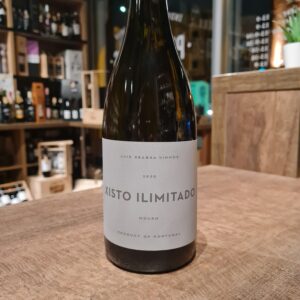 Another under the radar Portuguese White. This drop is now considered one of the new best contemporanean whites in Portugal. Produced by Luis Seabra, who worked for more than 10 years as an oenologist for Dirk Niepoort and finally started to follow his own path in 2012. The name he gives to his wines is indicative of his vision of wine: Xisto (Schist). He makes very pure wines that reflect their terroir. Luis Seabra sets a new standard in the Douro with his pure wines. Xisto Ilimitado, is a Portuguese analogue of the idea of a "village-level" Burgundy. A blend of six varieties planted in three sub-areas of the Douro, Ilimitado is a glimpse of the appellation's schist soil. Luis Seabra, has concentrated his production on the different soil types of the valley. Bright, concentrated and fresh, Xisto Ilimitado is an excellent introduction to the new Douro. Vineyards located in Cima Corgo. The vines are between 30 and 45 years old, planted in micaceous schist at an altitude of 500 to 600 m, and are a sub-region that experiences extreme highs and lows in terms of temperature, with one of the largest day-night temperature deltas in Portugal. As such, the fruit experiences an extended resting period. Annual rainfall of 400 mm typical of the region. Goes wonderfully with roasted poultry, white fish and seafood, and especially with the spiciest preparations
Another under the radar Portuguese White. This drop is now considered one of the new best contemporanean whites in Portugal. Produced by Luis Seabra, who worked for more than 10 years as an oenologist for Dirk Niepoort and finally started to follow his own path in 2012. The name he gives to his wines is indicative of his vision of wine: Xisto (Schist). He makes very pure wines that reflect their terroir. Luis Seabra sets a new standard in the Douro with his pure wines. Xisto Ilimitado, is a Portuguese analogue of the idea of a "village-level" Burgundy. A blend of six varieties planted in three sub-areas of the Douro, Ilimitado is a glimpse of the appellation's schist soil. Luis Seabra, has concentrated his production on the different soil types of the valley. Bright, concentrated and fresh, Xisto Ilimitado is an excellent introduction to the new Douro. Vineyards located in Cima Corgo. The vines are between 30 and 45 years old, planted in micaceous schist at an altitude of 500 to 600 m, and are a sub-region that experiences extreme highs and lows in terms of temperature, with one of the largest day-night temperature deltas in Portugal. As such, the fruit experiences an extended resting period. Annual rainfall of 400 mm typical of the region. Goes wonderfully with roasted poultry, white fish and seafood, and especially with the spiciest preparations -
Out of stock
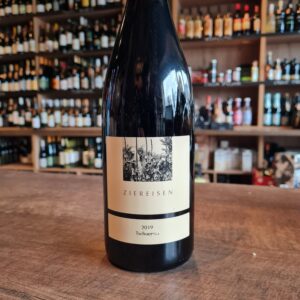 The Ziereisen winery in Efringen Kirchen in the Markgräflerland in Baden has meanwhile become an institution in its own right. Hanspeter Ziereisen originally trained as a carpenter and is therefore a real career changer who has never trained as a winemaker. His parents ran a mixed farm with pigs, cows and 0.5 hectares of vineyards. Overall, the place was characterized by part-time winegrowers who gave their grapes to the cooperative. The successor to the farm was initially uncertain, since none of the children wanted to continue it. In 1991, Hanspeter followed in his parents' footsteps with the clear goal of turning it into a winery. The small area yielded a first vintage of just 6000 bottles in 1993. Acquisitions and leases followed, and over time the business grew to today's 21 hectares. Hanspeter was interested in wine from an early age and so he tried a lot of the most interesting wines in the world. This is how he discovered his love for the red Burgundy. These are still the heart of the company today. With his style, Hanspeter Ziereisen encountered a lot of resistance. An individualist, as fellow winemakers call him, who doesn't want to produce pleasing wines, but independent ones. Spontaneous fermentation, long maceration times, long yeast storage, no filtration and the use of large and small wooden barrels - all this characterizes his style. This stubbornness or the clear definition of one's own style was also punished in the official wine testing. His wines did not fit the classic German profile and could therefore only be sold as country wines. Hanspeter Ziereisen stayed with his line and today his wines are their own brand. In the meantime a conscious decision in order to be able to design the wines in a way that corresponds to the philosophy and to be able to place the character of the wines in the foreground.
The Ziereisen winery in Efringen Kirchen in the Markgräflerland in Baden has meanwhile become an institution in its own right. Hanspeter Ziereisen originally trained as a carpenter and is therefore a real career changer who has never trained as a winemaker. His parents ran a mixed farm with pigs, cows and 0.5 hectares of vineyards. Overall, the place was characterized by part-time winegrowers who gave their grapes to the cooperative. The successor to the farm was initially uncertain, since none of the children wanted to continue it. In 1991, Hanspeter followed in his parents' footsteps with the clear goal of turning it into a winery. The small area yielded a first vintage of just 6000 bottles in 1993. Acquisitions and leases followed, and over time the business grew to today's 21 hectares. Hanspeter was interested in wine from an early age and so he tried a lot of the most interesting wines in the world. This is how he discovered his love for the red Burgundy. These are still the heart of the company today. With his style, Hanspeter Ziereisen encountered a lot of resistance. An individualist, as fellow winemakers call him, who doesn't want to produce pleasing wines, but independent ones. Spontaneous fermentation, long maceration times, long yeast storage, no filtration and the use of large and small wooden barrels - all this characterizes his style. This stubbornness or the clear definition of one's own style was also punished in the official wine testing. His wines did not fit the classic German profile and could therefore only be sold as country wines. Hanspeter Ziereisen stayed with his line and today his wines are their own brand. In the meantime a conscious decision in order to be able to design the wines in a way that corresponds to the philosophy and to be able to place the character of the wines in the foreground. -
Out of stock
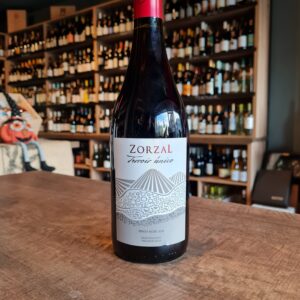
Founded in 2008 to promote the un-explored wine region of Gualtallary. The project is benefitting from investment in the best equipment and team possible. This new project is based on traditional winemaking, with medium scale production. Juan Pablo Michelini is responsible for the core of the concept, which revolves around majority of work being done in the vineyards. This combined with minimal intervention winemaking, best reflects the Gualtallary terroir.
Gualtallary is a remote place in the pre Andes, located in the Tupungato Department in the Northernmost sector of the Uco Valley in Mendoza. It is the highest altitude zone in the region, 1,200 to 1,600m above the sea level.
It has alluvial, primarily sandy soils with calcareous deposit and sectors with a presence of smooth round granitic riverbed stones, covered by calcium carbonate. The vineyard where this variety is grown is situated 1300 metres above sea level. It is a young vineyard, planted on chalky soils, with a very pronounced slope. This helps to keep the ground healthy, because there is no accumulation of water or frosts. The climate is mountainous, so we have a very wide temperature range, resulting in grapes with thicker skins considering it is a Pinot Noir.
The wines have lively, slightly austere profile, reflecting the soils and the altitude of the area. This hand harvested, single vineyard from Gualtallary is 100% Pinot Noir and is completely un-oaked to let the fruit driven quality of the wine shine. Great with and without food


